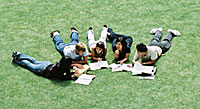|
|||||||||||||||||||||||||||||||||||||||||||||||
| Biotechnology A - BIOT3011 | |||||||||||||||||||||||||||||||||||||||||||||||

Description The basic principles involved in the operation of microbial processes on an industrial scale. Includes: the isolation of commercially useful organisms; the selection, maintenance and improvement of microorganisms using conventional and recombinant genetics; the influence of physical and chemical factors on the microbial environment; the control of environmental factors; extremophile biotechnology; the effects of operational patterns on batch and continuous flow cultivation; air and media sterilisation; the harvesting, purification and standardisation of products; the principles involved in microbial processes for chemical, pharmaceutical and food production. The laboratory component includes manipulation of industrially important microorganisms and isolation of novel microorganisms. Industrial and other invited speakers will cover issues related to animal and plant transgenics; the human genome project and medicine; advances in food biotechnology; and commercialization issues.
|
|||||||||||||||||||||||||||||||||||||||||||||||


